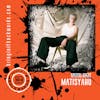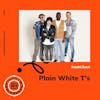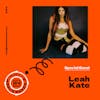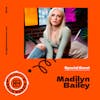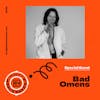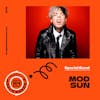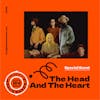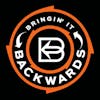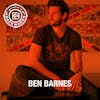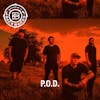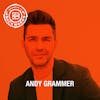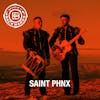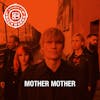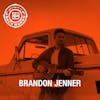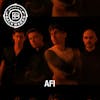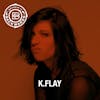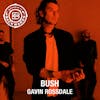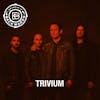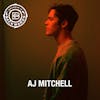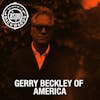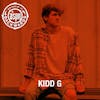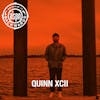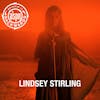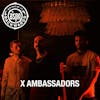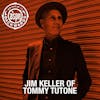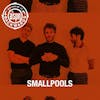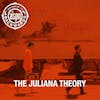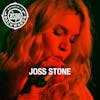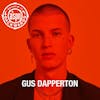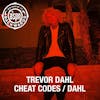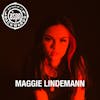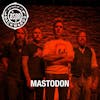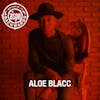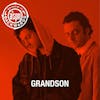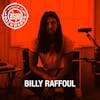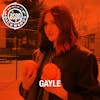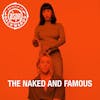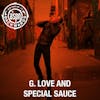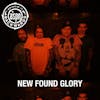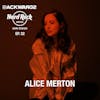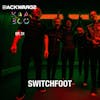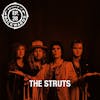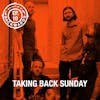Interview with Foy Vance
We had the pleasure of interviewing Foy Vance over Zoom video!
Award-winning Northern Irish singer/songwriter Foy Vance has unveiled his new single “Sapling” (feat. Rag’n’Bone Man). The song is available to stream and download via Ed Sheeran’s...
We had the pleasure of interviewing Foy Vance over Zoom video!
Award-winning Northern Irish singer/songwriter Foy Vance has unveiled his new single “Sapling” (feat. Rag’n’Bone Man). The song is available to stream and download via Ed Sheeran’s Gingerbread Man Records/Elektra Records. A stunning new version of the opening track on Vance’s new album Signs Of Life, “Sapling” is now a moving duet between Vance and Rag’n’Bone Man, two of the most powerful male voices in contemporary music.
“Rag'n'Bone Man was my first choice for the UK duet of ‘Sapling’ not just because of his voice, but because of his soul,” comments Vance.
“I’ve known Foy for a few years now and have always admired his creativity and artistry,” adds Rag’n’Bone Man. “I’ve loved writing with him and am so happy to have been asked to join him on this track”
“Sapling” (feat. Rag’n’Bone Man) follows the release of a version of the track with additional vocals from GRAMMY-nominated singer, songwriter, and performer Anderson East. “Sapling” (feat. Anderson East) is available to stream and download now. A beautiful song written for his partner, who’d moved from London to join the Bangor native in his adopted home in the Scottish Highlands, “Sapling” has amassed millions of streams and received praise from The New York Times, Taste of Country, American Songwriter, and more.
“Sapling” (feat. Rag’n’Bone Man) arrives ahead of FOY VANCE PRESENTS SIGNS OF LIFE + 15 YEARS OF HOPE TOUR 2022, which kicks off in Woodstock, NY on May 6, and wraps in Los Angeles, CA on May 31. Special guests Lee Rogers and Gareth Dunlop will provide support. Tickets for all dates on the tour are available now.
The follow-up to 2016’s critically acclaimed The Wild Swan, Signs Of Life is Vance’s fourth studio album and second on Gingerbread Man Records/Elektra Records.
We want to hear from you! Please email Tera@BringinitBackwards.com.
www.BringinitBackwards.com
#podcast #interview #bringinbackpod #FoyVance #SignsOfLife #RagNBoneMan #Sapling #musicinterview #MusicPodcast #NewMusic #zoom
Listen & Subscribe to BiB
https://www.bringinitbackwards.com/follow/
Follow our podcast on Instagram and Twitter!
https://www.facebook.com/groups/bringinbackpod
We'd love to see you join our BiB Facebook Group.
4 (1m 26s): Hello it is Adam. Welcome back to bringing it backwards. A podcast where both legendary and rising artists tell their own personal stories of how they achieved stardom. On this episode, we had a chance to chat with Foy Vance over zoom video foyer was born in north Ireland and then moved to Oklahoma for about five years. And then back to Ireland, he talked about that and how he got into music. His dad was a singer and guitar player. Foy really didn't start sharing his music with people or joining any band until he was out of high school. He released an EAP after he graduated. He talked about what inspired him to really want to become a singer songwriter. He talks about writing a song that just kind of came to him in the middle of the night, or actually he was performing at a bar and he just started singing these words. 4 (2m 14s): And he said, it wasn't real late. So everyone was kind of, you know, wasted times. They weren't paying much attention to him, but he ended up going home, like writing the song out and realizing something traumatic had happened that same evening while the song was being written, he talks to us about the release of his first album. Hope meeting, ed Sheeran, actually having ed Sheeran be a huge fan of his. When ed Sharon was younger now full circle, he signed ed Sheeran's label. He's opened up for him. They have a duet together, and we hear all about fois, new record signs of life. You can watch the interview with foil on our Facebook page and YouTube channel at bringing it backwards. It would be awesome if you subscribe to our channel like us on Facebook and follow us on Instagram, Twitter, and Tik TOK at bringing back pod. 4 (2m 60s): And if you're listening to this on Spotify or apple music, it'd be amazing if you follow us there as well, and hook us up with a five-star review. 5 (3m 8s): We'd appreciate your support. If you follow and subscribe to our podcasts, wherever you listen to podcasts, 4 (3m 14s): We're bringing it backwards with full events. 6 (3m 16s): Pretty good, actually pretty good. It's been a bit of a shortened day, but I'm a reality day pragmatic day. So 4 (3m 23s): Is that right? 6 (3m 24s): Sometimes normalcy is the best thing though. Normalcy is the best thing to shift a bit of something. Then you Just go and clean the kitchen or do a couple of dump rooms. 4 (3m 34s): That's good. I'm Adam, by the way. And I appreciate you taking time to come hang out with me. I really appreciate it. So this is about this podcast is about you and your journey in the music industry. And obviously you can talk about the new music and the record that you have with rag and bone man, which I think is awesome. Awesome. Well, first off, talk to me about where were you born? Where were you born and raised? 6 (4m 0s): Well, I was born in banger, kindy, dine, Northeast coast of Ireland, but then at eight months old, we moved to Canton, Oklahoma of all places. Oh, 4 (4m 12s): Wow. That's a move. 6 (4m 14s): I know it's grown exponentially in the last sort of 46 years or whatever. There's nice. 600 people living there. There was like 180 people living there when we moved. It was just farmers and stuff. My dad was a preacher and he got a, he got a gig out there to like build a church, like physically build the church. He was building the on, then he preached them. And obviously buddy, we went out for that. So, wow. Yeah. I back at banger after, but I was about five when we came back to Bangor. So most of my memories are buying her obviously, but a lot of, 4 (4m 52s): Yeah, you were only there for like five you'd, like you said, a handful of years and then you move back bend to bang island. Okay, cool. 6 (4m 59s): It had, it had a way bigger impact than my brothers cause they were, you know, cause they were like in the Peewee leagues and stuff and you know, you know, playing quads and the, and the, and the school bond. And they got a bit more of the experience than I did as a, as a kid. But I always look back at it, like it was the land of milk and honey, you know, my dad always used to say, why did we ever leave? 4 (5m 20s): That's cool. I mean, how, what a big jump to be able to move from Ireland, all clear across the United States. Now you're in Oklahoma of all of all places. Right. And then, you know, then you, you move back after a few years, like you said, your dad helped build the church, like physically build the church and then preach in the church as well. Like how did that even happen? Did he like have guys there, it was like hiring on or like, how did that, how do you even get that gig and how do you move all the way across the country? I mean, not country, the skinny of the world. 6 (5m 55s): Well, it was a, what you call it, a stream of church, a brain of church, a creative church, a brown of church. I don't know what you call it, whatever it was called. Church of Christ. That's an American, that's an American upstart. You know, they're the ones that don't believe in having musical instruments when you're, when you're saying your worst men or whatever, which was, which is a weird concept. But at the same time, it was kind of cool because everyone then utilize their voices in a, in a more interesting way and you'll find in the parts or whatever. But yeah, so it was a random church called church of Christ that was trying to make inroads in the Ireland. 6 (6m 37s): My dad met one of the folks there. They was invited to the states to preach around. And when he was there, he got offered a job to, you know, they were looking to start a new church in Canton, Oklahoma, and Madame Madonna. I don't think he was hired to actually physically build the church, but like, you know what I mean? He was preaching at night, but these Mexican concrete in the day, even when he wasn't building the church, he had jobs like labor and jobs or whatever he was harmed in that way. So I think he just got mocked in him and the local farmers and they build up. Wow. 4 (7m 8s): Wow. That's really fascinating. Well, it's interesting that you said that they didn't have instruments in the church or that church didn't believe in having instruments. It was all boys and vocals. Was that something that your whole family took part in? Like, can everyone sing in your family? 6 (7m 22s): Yeah. To a certain degree, my eldest brother racing, wouldn't be the best night to be honest, which is shame because he can remember lots of words. I remember standing up as a kid, it was going, you know, all the words, it's a shame you can't sing. But yeah, I guess we all will sign in church, but you know, my dad said as we were at a church, dad had a guitar, never had of his hand 4 (7m 46s): Because he's a musician still. 6 (7m 48s): Yeah. So it wasn't, I think that was just a, a weird adherence To what the church wants. You know what I mean? I don't think he ever, you know, he, he never felt were instruments where the devils are. 4 (8m 2s): Right, right. Okay. So, well he played guitar. Is that how you got him then music was through your dad. 6 (8m 8s): Yeah, yeah. Yeah. I remember seeing him, I guess I would have been five or six Years old and I'd come home. No must have been six. Cause we, we we'd been back in Ireland for awhile for a minute and I'd come home from school and I, I could hear my dad playing. The guitar has always, he did. And he was in the kitchen and the door was closed, but it's one of those sort of glass and those little windows that have had like stay through the steel lines to the hard to break I could see. And basically, So I could hear him sing and I could see him sitting there and he didn't see me because his eyes were closed and he was lost. 6 (8m 53s): He was just lost. And I remember looking at it and think, I think, and I, you know, I don't know where he is, but I need to find out how to get there as soon as possible, you know? Cause that looks on signs. Incredible. And he's gone. 4 (9m 10s): Yeah. Wow. And then did you ask your dad at that point? Like, Hey, can you teach me how to play guitar or was that the first instrument you learned? 6 (9m 18s): Well, you'd already shown me a couple of bits. I was able to play the 12 bar, you know, that the, the, the, the, the, the, the, so, yeah, and I was always singing like from no wages. We were, there was always second in the house from, I was new age at all. You know, one of the killers things is when we were in the states, we would keep in contact with a family back in Ireland. Like my granddad, my granddad, my cousins, and all that by audio tip, they would record stories, you know, of what's happening with who and what's going on. And then my granny would invariably cover one whole side of the tape with her just singing the old hymns or something. I'm a grounded grumble in the background. 6 (9m 59s): And then we would do the same to them. We would all get together and sing songs and send it back. And I've still got those tapes. It's wild, it's wild and go back and hear, hear us all singing. That's crazy. 4 (10m 13s): That is so amazing. That is awesome. And especially to have your grandparents on, on some of those tapes as well. Wow. I would kill to have that. That's insane. That's so cool. 6 (10m 24s): Yeah. And you know what, I haven't done as much with, with it as, as I've sorta, Initially, as I initially desired to, you know, I mean, I did do one thing where I took one song called he touched me and all him, that my granny sang and won one Christmas years ago, I was asked to do a radio show and Belfast. So I took her voice and I had this guy, Andre skeet arrange a salvation army bond, a bras bond, sort of around it. And like Jude added with my granny who had been dead for 15 years at that point, that's 4 (10m 56s): Insane 6 (10m 57s): That Sam wasn't saying it, wasn't seeing at that point, I thought I should do a record of this. This would be just wild, you know? Yeah. Just for myself, you know, for the love of it, but I'm going to Ryan to a lot of things, man. 4 (11m 12s): I mean, I, where was your dad able to tell that show? Like, what is your parents think, seeing that like, that's, that's so cool. 6 (11m 20s): Yeah. My mom and all her sisters, Alma, Alma granny's kids were, were blown away over the moon to hear their grandma singing. I hear their mom. Sorry, on the radio singing. Yeah. Yeah. I blew their minds. Yeah. 4 (11m 35s): What a special thing. That is so cool. That is really, really cool. Okay. Wow. And I want to back up here a bit. So dad was playing guitar, teaching you some guitar around six, and then from there, did you kind of, once you learned chords, were you like off to the races with it and writing and or how did that, like, how did your music, you know, journey kind of progressed from there? 0 (12m 1s): American corn farmers, a proud and chosen profession, inspired through generations, tested, resilient, and committed to giving back as much as they're growing, pushing the boundaries of what's possible with every bushel while replenishing every increasingly precious resource, like the reduction of soil loss by 40%, with every acre grown in a world where sustainability matters more than ever, we need to all the help we can get. And there's no greater resource than the capable hands of American corn farmers, 7 (12m 32s): Well tax season to your folks into, you know, Whoa, where'd you come from 8 (12m 37s): April here to tell you about the tax filing software from tax act 7 (12m 40s): Seriously. Were you like hiding behind my desk? 8 (12m 42s): Seriously. Tax act makes it easy to get your maximum refund. 7 (12m 46s): Well, you heard it here. First folks, 8 (12m 48s): Switch to tax act today and you can start for free. 7 (12m 50s): Or as we say in radio land, 8 (12m 54s): Subtle Tax act file for less and get more, see tax 10 (12m 59s): Act.com for details. 11 (13m 1s): Introducing big fish grant aristocrats, newest games lashing, soon it casinos everywhere. Visit aristocrat gaming.com to learn more 12 (13m 15s): Gambling problem. Please contact the U S national problem. Gambling helpline at 1 805 2, 2 4700 New Jersey at one 800 G a M B L E R New York at 8 7 7 8 H O P E N Y. Or text H O P E N Y 4 6 7 6 9 4 21 and older. 6 (13m 31s): No, I, you know what, I guess it was partly the nature of the world that I grew up in that I'm surrounded by. I didn't know anyone that was an artist. I didn't know anyone that made music. I didn't know anyone that knew anyone that made music for a living. I was just on her and to me, I've never, I never considered it. I just thought it was my private passion, you know, and I would, piano is what I played most. You know, my dad got me a keyboard and I played out as much as I played the guitar, to be honest, but it was always something I just did on my own. And once in a while, I'd be out with friends and I'd start singing. A few of them would go here. 6 (14m 12s): You can actually sing. And then I would, you know, shut up, you know, don't, Don't, don't, don't put it on that. Yeah. So I never really, it was only like when I got there, but at 17, 16, 17, I started meeting other kids that were actually had bounds and stuff. And I was like, wow, you can do that. And I never really kind of fit an end to any of those bonds, which I think was probably my own was what I was bringing to it. I was feeling inadequate, you know, I don't know all the kids were Kids that had sort of some Sammy, rich parents, Sammy affluent parents, and, you know, they could rehearse in their garage and they all have gear and all that. 6 (14m 59s): Not that I just rock up and feeling like a Tet going, I don't belong here. So I, I, it was a private passion for the longest time. And then I just started doing, I started right with a bond when I was 17, 18 that I sort of fell in with. Then it kind of went okay, but I was too flaky. I never saw, I never saw it for what it could have been. I just thought it was gotten around. And then, and then I got offered a gig through that as a singer in a soul band, which was just a covers bond, but they had three, they had three gigs a week. 6 (15m 39s): So for the next two years, I was doing minimum three gigs a week. And it was only at the end of that two years when I was about to turn 20, I think it sort of dawned on me. I was like, hang on a second. This is the only thing I do know. I don't do anything other than music. I'm not, you know, it's not my own stuff and it's not where I'd like to get to. Cause that's, the agent was starting to get interested and write myself. But I had nothing to say for fuck's sake, you know, nothing to say, but I was intrigued by it, but it was only then after two years of doing it, that that I realized, wow, this is actually a, a viable career. 6 (16m 20s): I, by that time I've met, you know, folks that were in their forties, fifties and have made a career of doing this. And I'd never worked a normal job. They've always played music. And, and that was, that was when the penny dropped. It was like, wow, I got my shit together here and put a bit of a plan in place and then worked my ass off. Like it might be, do something, You know? 4 (16m 46s): So, yeah. But from that where you did, you actually start re I mean, it sounds like you weren't really writing your own songs at that point or were you and 6 (16m 54s): I was, but they were terrible and that's not me being humble or self-effacing for any reason, it's just genuinely, they were horrible. Just, you know, borrowed knowledge, you know, th there was nothing original. None of it came from my core. You know what I mean? None of it transcended the competent parts. If you know what I'm saying, 4 (17m 19s): Hard thing to find, right. I mean, it's to come right out the gate and just start writing these amazing songs to know exactly who you are and what you sound, what you want your sound to be. I mean, I, I can't think of an artist off the top of my head that could, that has done that. I mean, I don't know, but like out of anyone I've interviewed, it's never been like, yeah. And then I woke up and wrote this huge song and I knew exactly, like, I think that'd be a hard thing to find. 6 (17m 44s): No, it's, it's a graft. It's a graft. It's like anything in life, you know what I mean? You want to become a great golfer. You going to make him come a great boxer. You want to come a great songwriter, a grip, brick layer, graft, do it, and do it more than anyone else find, find the person that's doing, doing it the best and doing it as doing it more than anyone else, and then do twice what they're doing 4 (18m 6s): For sure. 6 (18m 7s): And you'll definitely see a result that moment. It's about work ethic more than talent. 4 (18m 14s): So were you just writing at that point where you're like, okay, this is something that can happen. I see other people doing this as this is their life. They play songs and they, and they get to be in bands and, or do you go home and you start writing songs and like, how do you, then you, you start playing shows just as like a singer songwriter. Like how, how does it go from there? Yeah, 6 (18m 33s): I did that. I was still doing my cover gigs, but then I would find singer songwriter nights and I would show up there and, you know, exhibit malwares, so to speak. And I wrote some songs that, you know, had something by, by the end of that period. I was starting to get some more, I was starting to get a grasp on it, but I hadn't, it hadn't connected with me in Italy at that point, I don't think. And I guess the, the truth of it is I got married at 23 and me and my wife thought at the time, the best thing to do would be to move away, just to get away, focus our minds for a year, be married, figure out what we want to do. She was a Panther. 6 (19m 13s): I was wanting to get an, I was wanting to just write songs at that point and do nothing else. And that's just focused on that. So we moved to <inaudible> in the Canary islands for a year. And within three months of moving there, I was, I was doing a gig and a place called the jellyfish and cost of the Yeezy. And it was about one in the morning. And I was doing what I often did. I would try and make up songs on the spot and see if I can get away with it, you know, which was easier as the night went on. Cause people were drunk. So, you know, you just have you find it by just saying some shit over. It doesn't matter what it is. Doesn't have to be, doesn't have to make sense, just make noises and, and have crack. 6 (19m 56s): So I was doing that and I kept singing this song that just kept going, crying, crying, crying, crying in the night, crying in the night. And it really affected me. It really affected me when I was singing it and I couldn't stop singing it. I stayed in that sort of mantra for a long time. And then on the drive home, my wife at the time, Joanne said like, what was that crying, crying song? I said, I don't know what it was. I was, I was just sort of vibing on a bullet house, something there's, there's something, then it's pregnant with something, you know, I could feel it, it was different than other stuff I was writing. And I didn't really understand what, but there was something in it. And the wildest thing is I went home and I, and I, I actually did have a really rough night. 6 (20m 41s): The song was affecting me and I cried a lot. But the weirdest thing is I woke up in the morning to the, to the realization and the knowledge that my, my dad, as I was singing that song, my dad died on the other side of the world. 4 (20m 56s): Oh my gosh. 6 (20m 59s): In that moment, another lyric that I kept couldn't get away from was Jesus coming like a thief in the night. And then that ended up being the first line of the song. As soon as I heard the news on the phone from my mom, my brothers, I hung up, I walked back, I lit a cigarette and I wrote four verses without thought or without stopping and the verses, they stayed exactly as they came. And then that happened for a book that happened for a bud. Fuck. I don't know. It felt like years. It was probably only like six months to a year something songs. 6 (21m 40s): Then from that point on it wasn't that they were on top. It was that I couldn't switch the top off. The top was broke and the, you know, the, the faucet had been broken off and the pipe was just gushing and it was all, it was all kind of heavy, you know, picking up the scab shit, which I'm glad of in hindsight, it was rushed. It was shit at the time. Or it was tough at the time to sing that stuff. But at the same time it felt so fucking real, not stuff that I could have ever, or that I ever thought I should release. But just as the experiment of really engaging with what I felt and go on there with it, rather than trying to think of a course, that sounds nice. 6 (22m 25s): Or some bullshit, you know what I mean? 4 (22m 27s): Right. He's writing from the heart. 6 (22m 29s): Yeah. Yeah. And that, so that was the, that was the change then. And it took me a while to kind of refit the top and tamper that flow a little bit. But ever since that time, the flow's always been pretty steady as long as, as long as I do certain things. And you know, I'm, I'm clear of mind. It always shows up for sure. 4 (22m 50s): Wow. Did those songs and it becoming what that first record was hope? 6 (22m 54s): No, the first record I ever made was called Bailey's blood and it's been unreleased and it will remain unreleased as if I have Emily and the thing with it. 4 (23m 3s): Okay. So the songs that you're talking about, this song that you wrote about when your father passed away and everything that no, one's heard those haven't came out and they've never seen the light of day. 6 (23m 15s): They come out on EAP and a boat, but 2001, Which I have since bought every last existing copy of that. And I have it in my garage. 4 (23m 30s): You're really like, 6 (23m 36s): There's a few people that have like the old copy of their own, but they have, but there's no, there's no sort of, I have all the boxes. So 4 (23m 47s): I couldn't like Discogs it and find somebody's face of the planet. And maybe it's selling it on eBay or something. 6 (23m 54s): Yeah. Someone will be selling that on eBay, but listen, it's not worth it though. 4 (24m 1s): That's fair. So with those songs though, did you, like, how do you eventually get to putting out the hope record and obviously that did a lot of big things for you? 6 (24m 14s): Well, I guess between making that first record, Bailey's blood having the nightmare that I had with it, just the, the manager level, how well he was a used car salesman, says 4 (24m 28s): It 6 (24m 29s): Was, 4 (24m 29s): We can probably go out and sell you then. Right. Got right. This guy, 6 (24m 37s): You know how to manage a business, maybe you know how to manage an artist. I dunno. Anyway, we just, we, yeah, it made a real high, but, and by the time it got to the point where I could have released the record, I just didn't want to, I mean, I'd already realized I don't want, I don't want to stand by that. You know what I mean? I'm glad I did it. The songs were important, the right. Clearly, you know, coursework, but I didn't want to have to be the first thing I put in, in the word, you know, but then sure enough, within a week I was going that's backup. I should not have put that on like that. 4 (25m 19s): Well, I'm sure there's a millions of people that have big, different on that subject, but so do you go like, I mean, 6 (25m 27s): At least, at least those ones, 4 (25m 30s): At least 6 (25m 32s): Literally tans and tans and people that would disagree with you, therefore. 4 (25m 35s): Okay. Well, I mean the record does awesome. Even had a song that made it onto a TV show with that album. 6 (25m 43s): Oh, Gabriel. On the bag of bomb. 4 (25m 45s): Yeah. 6 (25m 47s): I think that was, that was actually the demo. 4 (25m 50s): Oh, it was the demo. 6 (25m 51s): Yeah. It was a demo that they use. They didn't use the album version. That that was a real pen actually, because they use two songs and await grazing. Yeah. Grey's anatomy. 4 (26m 0s): Yeah. They were big for like breaking RJ, breaking bands and stuff. I mean, that did a great job. Whoever was the music supervisor over there is like a legend. 6 (26m 11s): It w it was a woman called Alex pot Savvis. 4 (26m 15s): Who's 6 (26m 15s): Now gone on to, she's got her own, I think she's got her own label, her own publishing company, obviously. You know what I mean? She's yeah. She was always going places. She was incredible. I'm real switched on woman. My inspired by her at the time, even while you're changing the game. So yeah, they put on a song called home bird and then a couple of weeks later, they put on a song called put on Gabriel in the vagabond. They were both, they were both demos. Wow. You couldn't buy it anywhere online. I was literally getting hate mail. I was getting hate mail from people, but, you know, because they couldn't get the song. So I really missed the Trek there 4 (26m 55s): Where you like, it's on this record. And they're like, this is not the same version. 6 (27m 0s): I know. I know. Right. I know. Yeah. No, my most of my career has been by default rather than design. 4 (27m 9s): What'd he say that 6 (27m 13s): Because it's true. You know, I haven't, I haven't always had, I have had moments obviously where I've made a plan, you know, when you set the goal and you stick to it and you do the work that you need to do to get the goal met. But for the most part, you know, because by the age of 29, I still wasn't signed to a label. I had no manager at that point. I had a kid on the way, you know, I was paying the rent by gigs and working on the coffee roastery, you know, So it, it was hard to make a plan. It was just do everything and anything that comes up that you can and take whatever opportunities come from that, you know what I mean? 6 (28m 0s): Like, like one of the saving graces for me, which was a bit wasn't design for sure was getting support tours. That was a design w you know, I was with, I was with a girl called Phyllis blazer at the time at ITB. And we pushed her. We went, look, let's rather than focused on me doing these gigs and, you know, building it up and building it up, just get me as many supports with really cool folks as you can. And boy, did she deliver? So the first year was Bonnie red and then it was Taj Mahal, and then it was buddy. And then it was buddy guy that was Tori ammos. 6 (28m 44s): And that was just such a, it was such a wild variety of, I mean, the list goes on. It was, I got a great run of it for awhile. And even, even though I designed, you know, me and my managers had kind of designed this, okay, let's do that. So as we can then, you know, Pell for, from, from someone else's cried, not, not to steal them away from them, but they're like, is there any, you know, just get in front of the different cries that listened to different stuff and see who's entered. That proved to be gold. That proved to be gold because word of mouth is something that you can, you can count on. You know what I mean? If you see a poster and time that says, this is going to be the best record you've ever heard, it's coming out next week from a guy you've never heard of chances are, is probably going to be shaped. 6 (29m 31s): But, but, 4 (29m 32s): But you might give it a listen. 6 (29m 34s): You know what I mean? But if you're me and says, Hey, I went to see so-and-so the other night and the support bond or the support was, you know, blown away, like all the CTE, and there you go, you're going, that's, that's gold. And it's real. You can, you can literally pay your rent on that shit. 4 (29m 57s): Yeah. I mean, it says something, if somebody that you trust or you admire, whatever is telling you like, Hey Jay, you should check this out. Like, or your friends, like, Hey, this movie's great. You'd probably go watch it. Just to see what they're saying. If they're like, oh, you got to see this guy play. He's incredible. I bought his record it's oh, okay. And I bet you you've landed a lot of fans that way as well. Like, oh, he likes him, then they must be cool and I will, they co-signed on it. So I'm going to take a listen to chance on this person. 6 (30m 24s): And it was a lie was the only way for me to really do that. Well, that's a way that I wanted to do it. It's the way that I knew would make more sense, because I didn't mind that people came to the show and didn't like me. That's okay. I was interested in the people that came to the show on dead. Like me. I was engaging with, I am going okay, well, there you go. I'll be back. I'll be back shortly. And, and then go to someone else's show, okay. Your friends. And then, you know, just build it up like that, that that's, that's steady. You can, you, you know, lets you build your audience that way. And also I was what then 30 at the time, you know, no one was putting, was going to put my songs on rainy or whatever. 6 (31m 7s): There was one guy, my songs, my CD gets sent to a guy at radio, the reply to my PR guy or the radio pitch Glover at the time was I'm not even going to listen to this. Julie, if I, if I hear another Irish singer song writer, I'm going to stick a knife in my ears. And I also, I also realized in that thing, like, radio's just a different, it's not music. It's it's music that it's about music. You sail with music you were or whatever. It's not. 4 (31m 37s): That's interesting. Yeah. You're spot on man. From a guy that came from radio for the past 17 years. I totally agree with everything you just said right there. It's a totally a weird thing. It's yeah. 6 (31m 51s): Do you know what? A couple of years back, they put these jingles online from the seventies there and it was Jimmy Hendrix had done a jingle for Randy alum on a signed it, signed it fucking incredible. And I retweeted it going, why is it that in the seventies, you know, jingle sounded like music. And today music signs like jingles, you know, it's almost like a presidential speech, this little sort of second snippet. Boom the thing. And then repeat the other thing and then go back to that and then repeat this thing. 4 (32m 26s): Totally 6 (32m 27s): Plastered eyes, all the words. I don't know what's going on with that. You can't sing normally and get on radio today. You gotta, you gotta say some weird shit to get on there. 4 (32m 37s): No. Right. And then it always evolves. If you get on certain, if you, if you start off on an alternative station, then you cross over to the top forties CHR station, then it's like, okay, we got, and it's funny because thinking I worked for an alternative station, we played rag and bone man, who's on your, you know, your song w we played human and then it crossed over to top 40 radio. And it was like, they added some like, upbeat, like, like beat under it. And I'm listening to them like, what hat, why does this sound so much different? I'm like, oh, they sped it up and add that, add a little like flavor to it. 9 (33m 8s): And it's like, of course, 4 (33m 11s): Yeah. We've interviewed artists that we used to play in. It would be like, they cut the whole intro of the song off. So it just started with the boys. And like, it's just an interesting game that they play 9 (33m 20s): Over there. 13 (33m 22s): Hi, I'm Flo from progressive being a baseball fanatic, like me can be stressful. It's not all sports points and touchdowns. So progressive is going to help you take your mind off your team for a moment, instead of thinking about how they miss that gold point score. Think about the name, your price tool from progressive letting you choose coverage options based on your budget, unlike your team that missed the end zone net area. Well, anyway, hope this distraction about Progressive's name, your price tool was helpful. It sure kept me from thinking about all those penalty balls. Yeah. He's bored. 14 (33m 48s): Progressive casualty insurance company and affiliates, price and coverage match limited by state law. 4 (33m 51s): Hey, everyone. We want it to tell you about another music podcast that we've been loving. The broken record podcasts from Pushkin industries, music industry icon, Rick Rubin, along with producer, Justin Richmond and authors, Malcolm Gladwell, and Bruce Headlands. Sit down with the artists you'd love for unparalleled creative insight into your favorite music. You'll hear revealing interviews with some of the most legendary figures in music like Neil young, Andre, 3000 Alicia keys and Bruce Springsteen. And you'll learn about up and coming stars like Michelle Zonar, who talks about her big plans for her dreamy indie pop band, Japanese breakfast. This April, they're celebrating the red hot chili peppers, new album with John for Shantay Anthony Kiedis flee and Chad Smith, all in conversation with Rick Rubin. 4 (34m 39s): They share stories and songs from the new album, and also never before heard insights about their decades, long dynamic and chemistry, listen to broken record wherever you get podcasts. 6 (34m 51s): Yeah. And I don't even, I don't know what the game is and I don't really want to know. But one thing I do understand is that the second there's any sniff of making money from a track suddenly everyone's interested. And for whatever reason they want to spend shit tons them on, they own shit that doesn't actually change that much. I guess what, with the music industry, as far as I'm concerned, every hit has a frozen father's and every message is a bastard. 9 (35m 20s): I love 4 (35m 21s): That. 6 (35m 22s): That's what they're like. That's what they're like. That's what they're like. They don't, you got to understand the people that run this shit. Don't actually, I don't even think half of them like music. 9 (35m 34s): That 4 (35m 34s): Is amazing. I'm curious. Was it on the hope album cycle that you did the prisons in England? 6 (35m 43s): Yeah, it was around that time. Yeah. 4 (35m 45s): Who is that? Like some Johnny Cash inspiration, 6 (35m 49s): You know what I did want, I even started wearing black. I really embraced it and went for, it was a bit tongue in cheek, but I thought it was funny. I was just doing it to make myself laugh, But it was, yeah, it was, it was cool. Like, I think I'd gone in there quite honestly, with, with the, with the impetus to, or sorry with the, with the view to like return to the scene, which I did with a few of them. I did return again, but the plan was to keep going back and then maybe set up a song writing workshop. Cause I know what's, I know what songs did for me. You know what I mean? Like genuinely engaging with the reality of me and reality of anything that I think in fail transformed me and give me some, give me, give me a way out. 6 (36m 38s): Give me an ex, give me a way of expressing, gave me a way of being real with myself. You know, being my own counsel. Well, music's been my counsel, but you know what I mean? And I thought, well, what better place to go? I mean, you know, to go and try and sure. Song writing in that with, you know, with that view and not the push it, not the push out of Jamba and Glen go, all right, everyone, let's talk about all the people that you killed. You know what I mean? 4 (37m 4s): Yeah. I think you're going to say I'm going to come, I'm going to come back and I didn't know if you're going to be like, but I'm going to be incarcerated at this time or something. Sure, sure. Well, so I want to talk to you about, so the next piece of music or body of work you put out was the Melrose EAP. And that was something that even became what the score to a movie, a short film. Did it start off as a, a record or as the score? 6 (37m 37s): Do you know what it started off as just me and David Holmes and the producer from Belfast. It just started off with him and I working together really. I would have intrigue, you know, to see what, what, what would happen if we work together. And then we ended up doing sort of working on a few things and some of what was my stuff from some of it was other stuff. Some of it was his stuff, but his record, the holy pictures, which is an incredible, actually incredible album. It was a real joy to work on that actually it was probably just working on that then him and I got shot. And then he was like, okay, what songs do you got? 6 (38m 19s): And it was funny. All the songs that I thought were my strong ideas. He was like, nah, nah, nah. And then the ones that I thought were completely for me, private private songs, you know, part of that 80% that no one ever gets to hear, you know, They were the ones he was going to that there we go, that's got something let's, let's do that. So we just started on a journey and we, there was talk of it being an album and then it was going to be an EAP. And then Terry George had the shore, the, the short film and he was running the host and we were chatting that he'd heard, that was, he wants the bat straight away. And then he sort of, yeah, so it just kind of happened again, 4 (39m 2s): Default 6 (39m 3s): Rather than design, just be in there by working The harder you work, the luckier you get, I'll tell you that you just stand up better in right. Places from time to time because you put yourself in those positions. So yeah, that's a, and then that sort of give us the impetus then to really do something with it and was like, okay, now we got to go, we got a finish line. Here's the finish line. Let's get the shore wrapped up unreleased as, as an AP. And then we're done because we've been working on it for like off and on over three or four years. And you know, I think we were both getting frustrated and he was probably just getting more frustrated with me to be honest, 4 (39m 46s): But wow. I mean, the films was amazing. I mean, let it get us an academy award. 6 (39m 51s): It won't Oscar. Yeah, that's right. 4 (39m 52s): Wow. Did you get to take part in that at all? Or was that just something that happened for the film and You're a part big part of it? I would say it sounds like, I mean, with the writing, the whole score to it, 6 (40m 4s): I was at well less than right in the whole score two. It lets you know who David Holmes is, right? The, 4 (40m 10s): Yeah. No, but yeah, but I'm just saying that you are a part of it. Okay. That's my point. 6 (40m 15s): David did this. I did, I am 4 (40m 18s): Contributing. 6 (40m 20s): I'm wrote songs and stuff, but the dead, the score David is the man that does the scores I had. No, no I was in, I was actually in, in Nancy's bar and our dry on Donegal Having, having a sing song. In fact, we're playing Scrabble is what we're doing. And I got the tactical and won the Oscar. 4 (40m 41s): Wow. That's huge. I mean, well, how do you even react to that? Is it just like, oh my gosh, like this is insane. Or like, what was that like, 6 (40m 51s): Oh, do you know what it's easy for me because I didn't win an Oscar. Do you know what I mean? I was just, I was overjoyed for Terry, For Terry, George, you know it, you know, it's not like it was, you know, the best score to a short film. That was 4 (41m 7s): Part of the project. Yeah. 6 (41m 9s): First year. No, I was, I was honored to be part of the project and honored to work with David Holmes and honor honor to work with Terry George, but I was just more a kind of, okay. Yeah. I was, I was over the moon for, for Terry really? You know, just over the moon for him. Yeah. It was a pill for him to bring, bring an Oscar back then, 4 (41m 32s): For sure. With that, with that next record, Wendy old, real quick. When do you meet at Sharon? And when does that, your relationship with him? For him? Cause I know he was he's on the next record, right? Joel, I have nothing. 6 (41m 45s): He is. Yeah. So as ads dive would bring them to my gigs. I think the first time ed saw me, it was at a festival and why and time in England. And I was on after a bomb called Ms. Ms. Lobby, that ad used to guitar tech for him when he was like 13, 13 or something like that, something like that. So he was at the gate with them and that's where he saw me. And then he had his dad bring me the like, I can't remember. It was a lot of gigs after that, like 40 or gigs or something. 6 (42m 26s): He would come like shows in London, shows Norfolk shows and wherever he w he would be there 4 (42m 31s): He'd play. 6 (42m 33s): Yeah. I get a lot of that time. That's kind of, all I did was gig. I didn't really release song or release music. I, I made, literally pays and sold them on the road and gagged and trying to pay my rent. That's what I did. But yeah. So that's where the relationship began, I suppose. And then just before he released, plus his first record, there were murmurings of this kid coming up through the ranks. And that was like, all everyone was excited about. And it was a man of mine, Michael Lackey, a photographer. He knows ed and added said to him, like, you know, for Ray, because Michael and I were both from back home. 6 (43m 15s): And, but we actually lived in the same place in London. So we'd see each other in the coffee shop or whatever. And it was like, you know, fully, right. Would you ask him, can I go as email? Maybe, maybe we could write together. So Michael hooked us up an ad, sent me a team on another song, which I can't even remember what it was, but I remember getting a team. I remember listening to it and going, this is grit. This is cool. I don't know what the ad, I don't know what I was. So I got back to him and I said, Hey, listen, you're great, man. This is killer. And I hear loads of shit's happening. And I think it's probably definitely going like this, but I don't think I'm your guy to write with. 6 (43m 55s): Cause I don't, you know, this is a binocular that doesn't, I don't really write him. And also I didn't co-write at the time anyway, I didn't really write with anyone else. Yeah. Maybe I was going to say not snobbery, but maybe it was in hindsight. I don't know. But I think it was just an keeping, keeping it secret was what it was. I was trying to make sure I kept it. You know, I didn't want to, loads of people said, do you want to write? You want to write? And I'll be like, why, why, if we write, is that, is that been so money? Is that why we write money? I'm going to write something that makes money or what are we re why would we write if we don't know each other? And we've got nothing to say. And I guess that's where I was coming from at the time. 6 (44m 38s): And I actually recommend that he write with a guy called lookin counting from Ms. Lobby, the bond w Tony. He said, it's really funny. You should say that. I actually know, look and I, you know, that's where I first saw you. And anyway, the point is, that's a long line and that's where it sort of started. We kept in touch. And then when he started doing real well, he did what ed does. And he reached out to everyone that he met along the way coming up or anyone that he was inspired by along the way, and to give us all a crack at a tour or whatever. And he gave me a, he gave me a shot at, at a support with him and the UK I'm in the states. 6 (45m 20s): And I just thought, that's the agent. I'm like 38 year old boldly, white Irish dude that lives in the mountains. Like where in the fuck am I ever going to go on a pop, legitimate pop stars tour? Again, I'm never going to get asked to do that. So I thought, yeah, let's do it. 4 (45m 36s): Sure. 6 (45m 37s): But then my marriage broke up and my daughter ended up coming on the road with me and it was all hell broke. Loose. Ed was really kind of there as a friend, really kind of solid and solid with like Ken Ella as well and still is to this day. Like, you know, very good weather. And I guess just through hanging, we ended up with the guitars out and singing. And then before I knew it, we had written a song and I, I sort of didn't know we were writing it. He told me afterwards, yeah, that song going on some CD and I was going, what song? 6 (46m 19s): And just go and touch and go. You wrote, you wrote it with me. I was going, I didn't write that mine. I stood there and watched you write it. He was like, no, no, no, you've never you come up or whatever, whatever. So he kind of opened my eyes to this kind of co-write and word and the anterior with him and the best possible way, you know? Cause it's kinda by that point that my goodness, I, I just loved the kid. I would've done anything for him. Cause he, he really kind of pulled it out of the bag. I thought I was going to have to lose the terror and stay at home and be with my kid. And he was like, what? Get on the bus man and bring the kid with you. 4 (47m 0s): That's amazing. 6 (47m 2s): Let's go. And I was like, are you sure? And he was absolutely. He looked after his and at the afters Royal, you know, real sweet, sweet human. 4 (47m 13s): He just seems like such a sweet person. Even watching him in that movie yesterday. And the fact that he's able to like make fun of himself. Like my favorite part of the movie is when he's like walking, he's like in the back backstage and his phone rings and it's his, his song is playing as his own ringtone. Like I just thought that was so funny. I'm like, of course, like, he's that cool? That he's like, yeah. I'll just jab myself by having my own song as like my, my ringtone. 6 (47m 41s): No, you know what, nine times out of 10, see, when something funny comes online about ed, like, do you remember ed shreds? 4 (47m 48s): Oh yeah. 6 (47m 50s): Ran series. So the first person that ever sent that to me was ed. I think he finds it hilarious even, you know, he takes himself seriously when he needs to. And he knows he's got to figure it out. And I wish I had the hat on. I had on me that he has about age. It was remarkable to see this kid. What was he? When I met him 21 plant, he, I don't know. Not only did he have the world at his feet, but he knew exactly what to do with it. It was incredible inspiring. It was like, wow. Where do people that you come from? 4 (48m 25s): Yeah. He, I mean, he's a, he's a superstar obviously. I mean, that's so, but to be so humble and so cool to say, you know what? No, come on, bro. I feel like the most people that can gain success are the people that do and, and have the longevity are people that are like, oh, like that, right? I mean, they're, they're humble. And not just like, I'm a rock star, like I'm above you type situation. I feel like he's not like that at all. 6 (48m 52s): Here's the thing I imagine ed would agree with us or say, this himself adds a word. He's not the best singer in the world. Lids the world. He's not the best guitar player in the world. Isn't where he's not the best song writer in the world. I guarantee you something. I don't, no one works as hard as him knowing, knowing like he's so passionate about it. And that passion comes through. If you're, if you're that passionate about something that's going on, it's going to relay. It's not about, he became, I don't, he didn't start grit. He became grit because he worked his whole off and he still goes, he works his ass off again. It's always about how hard you work. 6 (49m 32s): You know, the main heat. He wasn't gifted with the best voice in the world on the band. He was flipping ginger and he had here and he is any more big glasses. I mean, if you could think of anyone less likely to become one of the world's leading superstars journey, it would be that kid, right. That's what, that's what passion and genuine drive on a genuine heart does, you know, that's exactly what he is. And that's why he's got what he got because he, he put the RS in and he, and he curse. He's real. 4 (50m 4s): I love that. I love that. I want us to draw real quick to touch on we'll join nothing. I mean, you, you did it like a documentary about the recording of the album and people could watch that if they really want to get, you know, a real in-depth look at the record, but I'm curious, you won a prize right in north Ireland, north island music prize for that album. And what was, I mean, how has that like with your, like, to win that and is that, that must've been a huge deal for you and your family being from north Ireland? Like, was, is that like a massive accomplishment? I mean, I don't know what it, what it means to, to, to, to people in north Ireland, if you win that 6 (50m 44s): NATO day. 9 (50m 45s): Oh, 6 (50m 49s): Neither day. Less than it's. This is probably remiss of me to say this, especially I'm like it's been being recorded, but it's, that was, it was the first one they had. That was the inaugural kind of one. And they're, they're really aimed to do something good with it. And I appreciate that and they're trying to celebrate local music, but as I would need to dig a bit deeper, but as far as I can tell, it's judged by, it's not like by the folks, it's a panel of people on the arts council, Who in my estimation, I would imagine have a combined the age of 3 billion. 6 (51m 34s): I don't know. I'm not trying to be disrespectful, but I think, I think that could, I think it could mean a lot more than it does if it was put into the hands of, of the people. Yeah. 4 (51m 51s): When the first one that's cool. I mean, to win the very first one. That's amazing. 6 (51m 59s): I mean, I may, I don't think you can. I, it doesn't really matter. I mean, it doesn't, it doesn't, if I didn't win it, it wouldn't change the art When I did win it, then gee, you know, 4 (52m 15s): It was just something that happened along the way. I, 6 (52m 17s): I think awards are literally just a boat, the sweet daily that you get after it. You know what I mean? Like if you win a Grammy, it doesn't mean you're a better artist. If I was the one that ground me, it wouldn't mean that I'm better than any other artist. It means that for whatever reason, I've kissed them off. I asked that year and gone to enough kind of parties and sign it, you know, not people's houses and made them feel special that they vote for me. And then I win that thing. And then you, and then you, you know, your, your phase go up through the riff and you know what I mean? That's what they're about. I don't really feel like at a ward and 4 (52m 49s): Sure. 6 (52m 51s): Make me feel like a better song writer or a worst songwriter than anyone else we're not receiving one. You know what I mean? 4 (52m 56s): Yeah, no, I see what you're saying. Well, to just change gears back to the edge here for half a second here, cause that's, you signed to his label with the, with the wild Swan and you're still signed to the label and you put out your most recent record with him. Was that just kind of something that was a no-brainer to when he did he formed the label and then signing you like, like how did that, you know, kind of, kind of come back around. 6 (53m 20s): Even that question took way more than half a second. 9 (53m 25s): Okay. 6 (53m 28s): It gave a Ryan. Yeah. He'd set up the label and we talked about it, but he eats his first sign. Him was another guy called GME on. Then I was at a situation where I was free. We just have a chat. I was like, would you just want both going shop there somewhere else? You know, we, what do you think Tony was? And he was like, yeah, great. Let's do it. Do you know what the killers thing? Here's another measure of the month on his commitment to be in a patron. 6 (54m 10s): Not only to me, a lot of people, but he's pitching to me. And here it is. In a nutshell, after I did the wild Swan with him, I went the time we put some serious time, energy and money into that record. And the whole two year plan. And I worked my ass off because I wanted to please my Lima boss, you know, add the team around them. I see that we're all very supportive. I really want them to please them. So I, I worked as hard as I could took every gig that every interview turned up on the radio stations around the U S I'm actually, I wanna, I want to get back to the radio quickly at some point, just to say something about American radio, which is different. 6 (55m 1s): I worked so hard at the end of that two years I had, by that stage had a new son who was six months old. I was at dad's house hanging. I think we were writing or whatever, but the terror was over and I was going home and I pulled him aside and we're having a chat. And I said, ed, I've got to be honest with you, man. I'm never going to work that hard again in my life. I'm never, I'm never going to tear like that again. I'm eight months on the road. No, it's not me. Two weeks is too much, you know, two weeks too much already. I counter like that again. 6 (55m 43s): And I don't think if I do another record with you, you're going to make your money back. I mean, I'm like, dude, if you need to drop me, you do what you do, whatever you need to do. I just want you to know I get it. There's no hard feelings on, he said, FOI, every record you ever write, I will release. Wow. I said, Andrew, you're making it too easy for me. But it was like, yeah, no, don't worry about that. You make the music and I'll find a way to make it work. You know, he's, he's the best label boss in the history of label. 6 (56m 23s): Bosses. Be quite honest with you. I've lost. My dad always used to say to me, foist on you could fall and shit and come out, smelling the roses. 4 (56m 35s): Well, I want to hear what you have to say about American radio real quick. 6 (56m 39s): Well, I, I think it's different like earlier on, I sort of made a, quite a blanket statement, the boat radio and on high, all the, all the only thing that gets played on radio is just as sort of homogenized, you know, give me the mic three daily, please know songs. There's I don't know, no songs, just music, catchy, whatever. But that's talking, I'm talking about mainstream. Do you know what I mean? I think what I love about America or the, or the independence, you know what I mean? That are, that are really trying to kind of push local stuff or just play kind of play cool shit that aren't kind of as tied in to, you know, here's your play lesson. 6 (57m 22s): This is what you gotta do. You know, those folks that have the freedom to flip, I heard this CD this week out of the blue and I'm going to play it tonight. You know, that still exists in America. 4 (57m 33s): I mean, the station I was on, you could do that. I'm not going to lie. We were, we were independent. And my program director at the time was cool enough to kind of let us do that a bit. It wasn't like programmed by some guy in Houston, that's going to put the same playlist out to 180 stations or whatever. 6 (57m 49s): Yeah. That's what I mean. The bit we're individuality where everything else is, like I say, it's just to make the reading. It really is Damn shit. Everywhere you go. I don't even want to sit there for an artist that sort of science the same shit. Like, you know what happened to variety. I remember Sam Phillips when he started, that was, that was, that was almost the raise on bachelor. Like every artist has to sign different Domain. Roy Orbison doesn't sign like Johnny Cash who doesn't sign like Elvis, who doesn't. Well, he wants to sign like card partners. You're going to love this sounded like car departments, but you know what I mean? 6 (58m 31s): Like it was about Willie Nelson, you know, Kris Kristofferson voices. That's not so much Sam Phillips, but you know what I'm talking about? That's 4 (58m 40s): Totally 6 (58m 41s): Of like where it was like something that stood out that was someone doing something and not just all things about like wallpaper, 4 (58m 51s): Audio, wallpaper. Exactly. 6 (58m 56s): Okay, great. You know, you've read that. You've read the, the lovely sash windows and Pinellas white PVC bullshit. And what's going on. 4 (59m 5s): I love that. Well, let's talk about your new record signs of life and you're wearing the hoodie. Yeah, I like that. Is that a hoodie? 6 (59m 14s): It's just a jumper. You know what? This is. 4 (59m 17s): I like that though. I 6 (59m 18s): Wear it all the time. And the, the truth of the matter is, and this is not a sales pitch, by the way, truth matter is it's the most, it's the most comfortable jumper I have 4 (59m 28s): Comfy. It fits nice 6 (59m 31s): Company. It's a really cool company that I'm going to I'll you know what? I'm going to find out the name of them and send it to you so you can put it in. So those people, you don't have, people don't have to buy this one, just find out who this company is that make these kinds of jumpers because they're as comfortable as ghetto. They're so cozy. 4 (59m 46s): I love it. I think it's a dev sweater. I think it's awesome. 6 (59m 49s): When you can also buy this one. Yeah, of course. 4 (59m 51s): Yeah. I'll buy that one. I'll buy that one. Well, tell me about the record. 6 (59m 57s): Oh, well, I'm going to sign hypocritical telling you about the record being that I've made the stupid decision to smoke. I don't have a pint here. Chuck, me with me. Cause the record actually came about by getting off drank and stuff. Basically. I don't know. I, don't not here for wise swell on it. How'd that conversation with ed kind of going, I'm not working out hard again. I don't know what I'm going to do next, but it's not going to look. It's not going to look like that. You know, it's just not going to look like that. I can't be away this much. It's too much on the kids too much on me too much on everything. But then I had all these songs that I'd written that I've collected. 6 (1h 0m 37s): You know, the, there were sitting there. I'm my, my manager's on me. What's happening? Where are we getting the record together? And I'm like, yeah, yeah, I'm getting a record together. When I'm off the road. I was compiling songs going through all of the songs that I've written and I'm basically Frankenstein in a record together. Do you know what I mean? I sorta, I sorta knew I was doing it. Tell you it was going. That really doesn't make any sense for that. Miss them. And actually the whole thing. Why, what am I doing it for it anyway. Well, you know why I don't want to make another record, which is why I went off and made from muscle shows and to Memphis. 4 (1h 1m 19s): Yeah. You made two records in the same year, right? I mean, pretty much back. 6 (1h 1m 23s): I just want me to go off and blow out some songs that I'd already written that I liked and was happy with and that I could, I could get away with doing it without employing the, you know, the whole infrastructure of the label. You know, we're gonna make this the boy's next big release. It was just like a side project type thing, which frankly be in the ed. Sheeran's my label boss I can get away with. 4 (1h 1m 44s): And he told you, you can put out whatever 6 (1h 1m 49s): And fairness. And I must say, it's not just him. Ed Hart, the head of the level that, you know, Greg and Mike and the stance, the li the label folks are sweet and they're behind it too, but ad is the spearhead, for sure. So, yeah, I just didn't know if I even wanted to, when you wanting to make a record, but I didn't know why I was making a record. You know what I mean? I didn't want to tour again. And I really train, like the songs that I was compiling really made sense to me or where I was at. And that's because I was in a complete fog at this time, I was addicted to coding as well, which is the worst thing ever. 4 (1h 2m 34s): Oh, no. I mean, I have five years sober and I had the same problem, to be honest with you. Yeah. And it's, and it was brutal. I've had four neck surgeries and it just became a, you know, something that was the only thing that made me not hurt. And it ended up taking a lot from me. So it is a brutal, brutal 6 (1h 2m 56s): Cycle. What are those to your mind? What does tear inside your organs? It's crazy, but, and those, you know, the headaches that are brought on by it, that they only way to get through them as they get more. And it sounds like I was in a similar position to you or I was munching the things, you know, I was munching them like, you know, One time I, I had four in the morning, one time and last night's white wine. I'll never forget. I dropped them into the wheat, better white wine. It was left. I dropped them and I was sort of laughing about it. Cause I was still a bit pissed from the night before. And I, and then I drank it and then just, it was like, it was, it was the morning, you know? 6 (1h 3m 41s): So you imagine how the rest of that day went. I just felt, I had a couple of moments where I realized, hang on, what, how has this become normal? You know, I'm that's road. Life can do that. The road life can make a lot of things seem very normal. They're not normal. You know, it's only when you come back to the cold reality of the cool day of home life, you know, family life and reality, you know, the, the mundanity of the day, you know, the kind of, 4 (1h 4m 15s): Yeah, it's brutal. It's a brutal thing to be caught up in for sure. And it's like gets to the point where you, yeah, like you said, you need it. Right. And then like the tapering off is like, not even really an option at some point. 6 (1h 4m 32s): Yeah. I mean, quite frankly, I'm sort of back there and I tip her and all, but I'm not, I have not coding since, since when I give it up there and whatever that was 2018 when I kinda hit the wall, give everything up for awhile on that was, that was when I, I re sapling 4 (1h 4m 56s): Really. 6 (1h 4m 57s): And it was the first song that I'd written that I felt, okay, this is pregnant. You know, this is, this is more than just this song. This is because it was what was real. It was honest about where I was actually at like, kind of, okay, I need to give something up here. It's either this or have, yeah. And I guess I just felt overwhelmed in that moment that, wow. You know, here, I'll tell you what. I went to an AA meeting on the mind in front of me who was Irish. You don't have to be ours to be an alcoholic, but the fucking helps start my hand start. 6 (1h 5m 39s): He was talking about being grateful for that meeting that night, I think said, look, if I wasn't here, I would just be at home. And the flat across from the wine mark, looking at the people coming and going, wanting to go over there myself and just go on the me that as grateful as I was to kind of go older and acknowledge where I was at and myself, I realized, hang on, I'm surrounded by people that love me. I've got a studio, I've gotten the ability to write. I've got a team of people around me that want me to write and give them music and art, the baking, then go and put out into the world and think of creative ways of getting out there. I mean, I've got so much going on here so much to live for. 6 (1h 6m 23s): You know, why am I masking myself every day? What am I, you know, inhibiting my ability to kind of go off and, and do this. Just sort of, I can feed Fonzie and get drunk, or I don't know, it hit me. It hit me. I hit me hard. And that, that was a band. It was like, hi, the album wasn't called signs of life. But that stage cause, but, but signs of life had begun for sure. On, there were signs of life, you know, there was a sapling, you know, and searching on Oak, but I find a sapling and that was enough in that moment. And that moment that was like, well fucking, okay, there's that glimmer of hope in me. 6 (1h 7m 3s): I might go back. You know what I mean? I can maybe do this if I just stick with it and I'm still, still trying to stick with it. 4 (1h 7m 9s): Well, that's it. Yeah. I mean, it's, it's amazing that you're able to get off the Cody. I mean, that's the gnarliest thing of, of all. And I mean, yeah, I go into, I go to AA still and I, but I never did like any of the work. Right. They make you go through the steps and do the thing. And I just never did any of that stuff. So I've just been carrying all this baggage. And so I finally like, within the last year I was like, I'm going to go and I'm going to take this seriously. And I've, and I've been in, in, I only go a couple of times a week, but it's, it's nice, but it's interesting to hear other people speak on something that like, I'm like, how do I, like, it's weird. It's like, I can relate directly to you. Like, how are you in my brain? Like, it's really weird. Like how there's just like, there's total. 4 (1h 7m 52s): Like, you know, we probably have similar brains when it comes to this stuff like that. It's just weird how that is. You can like, you know, relate to somebody that you've never met or even, you know, never had anything to do with in your entire life yet. They're telling a story that's so similar to yours. 6 (1h 8m 7s): Yeah. And then I guess it depends on the meeting too. Right. You know, I've been there a couple where it was just like, wow, just this is going, like go in the evangelical church, just exchange Jesus for so bratty. Like they're, they're not telling their story. They're telling you how great it is. They're trying to sell you on this sort of thing. I'm going, if it's so easy, why are you here? You know, I'm, I'm here, I'm struggling. 4 (1h 8m 31s): Right. It's not that easy. And I think that's part of it. You're right. It's like, it's not easy. So you have to go. 6 (1h 8m 38s): I didn't come here to tell me, I dunno. 4 (1h 8m 41s): No, I feel you, man. I mean, there's a lot of time. I mean, it's, it was really hard for me to even attempt to go back to it. Cause I'm like, I felt the same exact way and I still, I don't know. I'm, I'm so new to being back there and, and really listening to it that like, I mean, we could talk in two weeks and I'd be like, yeah, I finally realized like, this is not, you know what I mean? It's just one of those things where like, it's interesting. It's definitely an interesting thing. 6 (1h 9m 5s): Do you know what, there's a grant book by a girl called Katherine Gray. It's called the unexpected joy of being sober. I'm 4 (1h 9m 13s): Gonna write this down. 6 (1h 9m 15s): It's a great, it's a great rate. I haven't finished it yet, but it's, I'm really enjoying it. Her writing's very it's what do they call it? My quite lit quite lit. Is that what they're calling it? Quit lit, you know, when you like quit literature. 4 (1h 9m 30s): Oh really? I haven't heard 6 (1h 9m 31s): That guy, whatever, but you know, it's not, it's not like the rent. It's not like sort of preachy or whatever. She's just kind of, she's very, very real about her experiences, but you know, we're, we're her addictions of ladder and whatnot and it's a BI it's a good re 4 (1h 9m 49s): I'm going to check it out. Yeah. Just sorry. I was just writing the notes on it. Yeah. I'm intrigued to read it. Cause yeah. There's another one that I read. I can't remember the name of it offhand, but it was, it was pretty good too with like the way it was written. I'm like, oh wow. This is like actually really relatable and not appreciate at all. So it was just kind of stories and it was interesting, but wow. Yeah. So I mean back to the record and signs of life. So that was a song that was written kind of around that time timeframe. Was that the first song you wrote from the record? 6 (1h 10m 20s): Well, no, the record ended up having songs on there that I wrote 20 odd years ago, but that's but sapling was when the record was both sapling was when I was like, okay, I'm making an album and I know, I know what to say. And I know what it's about. It's about re-emergence since about may trying to reconnect with a rebirth of myself that doesn't involve the previous self, which as far as I can tell is a, is an ongoing process, you know, you know, constantly going into hibernation, coming back slightly different than, than going back in and then coming out. And, but, you know, but yeah, that's so that's, that was the record was born or that, or the, my, the sort of impetus to make an album was born in me at that point, for sure. 4 (1h 11m 12s): Wow. Well, it's an incredible record. And again, I love the version with rag and bone, man. I think his music is incredible. And we're is that a relationship you had prior to the song? Or like how did cause you've had a couple of different features on that same song. Right? 6 (1h 11m 27s): Okay. Do you know what it's so weird? Cause I, I, jets are such a funny thing. I w I did want on joy, nothing as, you know, where they are, but there's a very, very specific reason for that. And I knew if it didn't sign, right. I wasn't going to you. I remember saying to him at the time, like, I hope you don't feel like if it doesn't sign that phase out or is weird or whatever are mercenary. That was my concern was like, but, but I knew why we were doing it and I, yeah. So I sat with myself on it, but I'd never thought of doing a Juliet since, until I was approached about doing one on sapling to release in the states. 6 (1h 12m 7s): And at first I went, don't be ridiculous. Like sapling, what am I, who on earth am I going to do? What would you add on sapling? I couldn't get my head. Right. And it was like, I don't know what you're talking about. And then as it happened, when I was in the states, I turned up the Anderson ACE house said a bit of a bad way. Just kind of have a few days of head rack. And hadn't been looking after myself properly. And soon as it got there, he put me right. You know, kind of fed me, watered me, took me down and got me on IV drip and stuff. And we have this eludes, a killer chats and stuff. And I remember that night, Sam, would you be interested in doing a cover this thing? 6 (1h 12m 48s): Because it, I felt that that moment he kinda pulled me out. You know what I mean? If it wasn't for him in that moment, I was, he turned me around and got me back on and I, I ended up finishing the rest of that run a different man than I came into it because of the time had spent with him. So it was like, that makes a call, stay. Even manager was like, hi, it makes sense to do it. But only with the understanding that he's the only person that I could do this with. And then it went well. And then the UK level were like, oh, let's do it again. And I was thinking, well, here we go again. But out of the list of names, they sent me, I saw Rory's no rag and bone. 6 (1h 13m 28s): And I immediately responded. 4 (1h 13m 35s): I want him 6 (1h 13m 37s): If rag and bone would did. That's the only there's there's no one, no one else would make sense. And that's just, cause I, I know rag and bone I've only met years ago when he was releasing human that record before he released it, I helped them write well data. I really connected with them. I just, I, I remember sort of feeling for him over the years because he's when he, when he started to do really well, I got a bit concerned because he's not this sort of, you know, young, white, malleable, blue eyed soul boy that they would like him to be. You know? So he's not, I knew he was, I knew he was going to come up against, I knew they were going to try and go, oh wow, this is hitting. 6 (1h 14m 20s): So now we want to push you. And I knew he'd be going here. Cause he's, he's a folky and heart. Actually. He loves folk music is his real passion. Interesting. He was sort of being forced into these pop roots. And I don't know, I sort of kept in touch with them over the years basically. And because I was thinking, wow, I was a guy like that. Gonna handle this FIM. Cause he's, he's a social worker. That's what he was beforehand or a care worker. Sorry, a care worker. Yeah. He's the, I know. Cause he looks like a big, Jan's scary monster. I need the sweet, soft, gentle man. You know, he's so gentle and so caring and I'm very family oriented. 6 (1h 15m 3s): You know, 4 (1h 15m 5s): You see him with his face tats and you're like, okay, this guy doesn't look like a social worker. 6 (1h 15m 11s): It looks like in <inaudible>, but nobody is as sweet as they come. And the inspiring dude. So I, again, I was like, okay, if Rory Rory would be interested, that would make sense to me. And he was, and then, and then he come up here and we wrote a couple of songs and we're gonna write again shortly and 4 (1h 15m 34s): Incredible well, that's awesome. And that's funny. I didn't know that he was such a sweet sweetheart at heart. That's awesome. Well, thank you so much for doing this. I really, really appreciate you taking so much time to hang out with me today. It's really been a lot of fun. I have one more quick question for you. I want to know if you have any advice for aspiring artists. 6 (1h 16m 3s): It's hard to distill lists. This question comes up a lot, right? And it's hard to distill it in any one thing In a word lesson, You don't pack that yourself, but less lesson and less than close work hard, that's it? That's it less listen to yourself. Like don't do shit that you don't the only, only do shit that when you listen to it and if you listen to that idea, you think about that idea. You feel passionate have, you don't feel that don't do. 6 (1h 16m 45s): And when you do feel it work fucking twice as hard as the hardest work motherfucker, you know,
Featured Episodes
Here are some great episodes to start with. Or, check out episodes by genre.
























